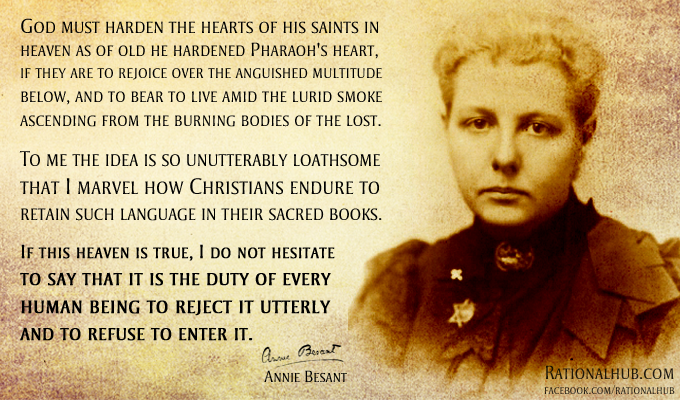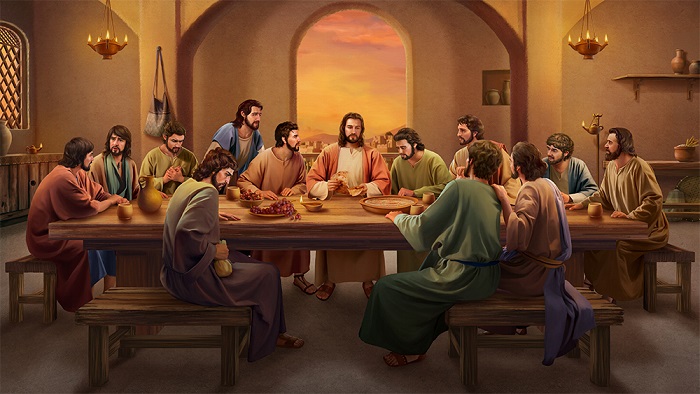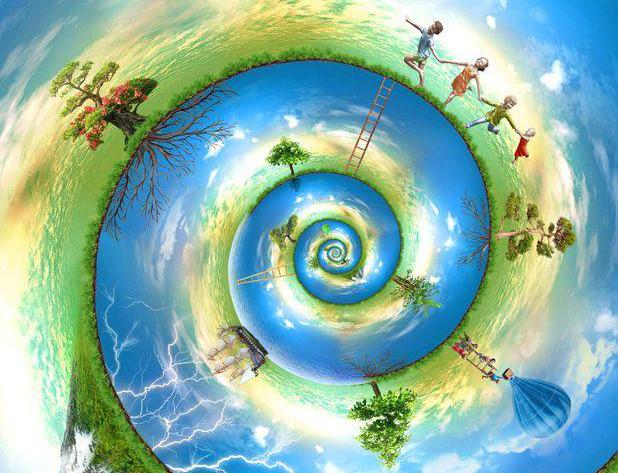吃不吃素食的迷思 — 吃肉的野蠻暴行
奧修談到肉食是暴力的行為,另一位英國人Annie Besant更加不客氣,
下文是她在1987年10月18日在英國曼徹斯特市的演講,
原文的文筆也有水準,就一併呈現這篇談暴力卻有非暴力美學的文字供欣賞,
短小精悍,擲地有聲。

When we recognise that unity of all living things,
then at once arises the question -
how can we support this life of ours with least
injury to the lives around us;
how can we prevent our own life adding to
the suffering of the world in which we live?
當我們認識到所有生命都是一體時,馬上出現一個問題,
我們要用最少的傷害去支援我們的生命,如何避免給我們居住的世界施加痛苦?
We find amongst animals, as amongst men, power of feeling pleasure,
power of feeling pain; we see them moved by love and by hate;
we see them feeling terror and attraction;
we recognize in them powers of sensation closely akin to our own,
and while we transcend them immensely in intellect, yet,
in mere passional characteristics our natures and the animals'
are closely allied.
We know that when they feel terror, that terror means suffering.
我們都在人類和動物身上找到共同的感官能力,感覺到歡樂,也感覺出痛苦,
我們看到他們根據愛與恨作反應,看到他們被吸引和害怕。
我們認知到他們身上的感官知覺跟人類很接近,
當我們用知識去大大提升這種認知,
只需熱情的特性就可以知道我們的本質和動物是一樣的。
我們知道,當他們感覺出恐懼時,恐懼就等於痛苦。
We know that when a wound is inflicted, that wound means pain to them.
We know that threats bring to them suffering;
they have a feeling of shrinking, of fear,
of absence of friendly relations,
and at once we begin to see that in our relations to the animal kingdom
a duty arises which all thoughtful and compassionate minds should recognize -
the duty that because we are stronger in mind than the animals,
we are or ought to be their guardians and helpers,
not their tyrants and oppressors,
and we have no right to cause them suffering and terror
merely for the gratification of the palate,
merely for an added luxury to our own lives.
我們都知道傷口都會痛,威脅就有掙扎,
他們會感覺出萎縮,恐懼,不友善的關係,
我們開始可以從中看出我們跟對動物的義務,
所有有覺知和慈悲的頭腦都必須認識到這種義務,
因為我們的頭腦比他們好,我們就有義務成為他們的守護人和援助者,
而不是他們的君主和壓迫人,
我們也沒有權力只為了自己的味蕾
和生活中的奢華就給他們施加痛苦與恐懼心理。
There is one other thought closely allied to this.
What of our duties to our fellow-men?
And here I appeal particularly to my own sex,
because women are supposed to be rather the standard
in the community of refinement,
of gentleness, of compassion, of tenderness, of purity.
還有另一個想法跟這個概念有關。
我們對人類同胞的義務又如何?我要在這裡特別呼籲同性的朋友這麼思考,
因為女人生來就應該是社會標準要求的高雅,溫柔,慈悲,善良,純潔。
But no one can eat the flesh of a slaughtered animal
without having used the hand of a man as slaughterer.
Suppose that we had to kill for ourselves the creatures
whose bodies we would fain have upon our table,
is there one woman in a hundred who would go to the slaughterhouse
to slay the bullock, the calf, the sheep or the pig?
沒有人能夠不必通過另一隻屠殺的手去宰割動物的身體來吃他們的肉。
假設我們也宰殺人類的屍體把肉擺在餐桌上,我們都會暈倒。
一百個女人裡面有沒有人敢走進屠宰場去宰割公牛,小牛,綿羊或豬的?
But if we could not do it, nor see it done;
if we are so refined that we cannot allow close contact
between ourselves and the butchers who furnish this food;
if we feel that they are so coarsened by their trade
that their very bodies are made repulsive by the constant contact
of the blood with which they must be continually besmirched;
if we recognize the physical coarseness
which results inevitably from such contact,
dare we call ourselves refined if we purchase our refinement
by the brutalization of others,
and demand that some should be brutal in order that
we may eat the results of their brutality?
We are not free from the brutalizing results of that
trade simply because we take no direct part in it.
如果我們都辦不到,也不能看到;
如果我們自己高尚到不允許自己接近那些為我們準備這些食物的屠夫們;
如果我們覺得他們的行業粗糙到他們的身體
因為長期接觸到血腥而讓人討厭也會沾污我們的品味;
如果我們認為跟他們接觸是粗俗不堪的;
如果我們通過對其他生命施加的殘暴來購買自身的高雅,
我們還敢說自己是高尚的嗎?
然後我們為了吃這種殘暴的產品就要求某些做法也必須殘暴才行嗎?
我們並不因為沒直接參與這個屠殺的行業就可以躲過殘暴的結果。






